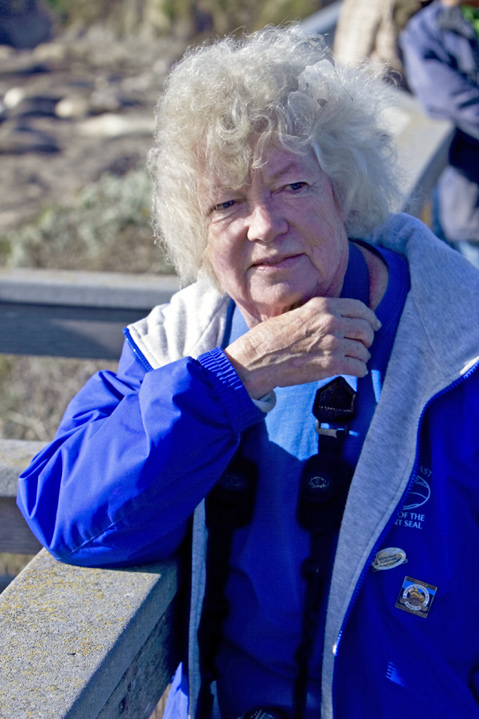Long before she made a name for herself as a cultural writer for the Santa Barbara News-Press, Joan Crowder was a volunteer editor of the Santa Barbara Survival Times, a fledgling monthly magazine of the newly formed Community Environmental Council. The council had formed in the aftermath of the 1969 Santa Barbara oil spill, and as Joan put it, the Survival Times was the voice for the council’s distinct brand of environmentalism. Some of its material was prophetic. In the early ’70s, its writers predicted that the Goleta Valley would one day be filled with houses, and it happened. They explored the idea of making the Channel Islands a national park, and it happened. Some warned that the land north of El Capitan would be developed, but it wasn’t. “We didn’t have computers,” Joan told me. “It was all typing, hand drawing, cutting, and pasting. Everything was done from scratch, and then it had to be put together for printing.”
Joan had an early love affair with newspapers that began with her first sight of a printing press, one of those massive and loud machines that people seldom see or hear today. She took to writing while in high school, where she was editor of the Sequoia Times at Sequoia High School in Redwood City. Her writing skills and excellent grades won her acceptance to Stanford, where she majored in journalism and met her husband, John, who was a medical student.

His career took them first to Minneapolis, where he interned while Joan took a position with the Miami Herald. It was in Florida that her sons Craig and Scott were born. After a short stint in New York, they made their way to a home in Montecito, where in 1967, their third son, Andy, was born.
Following her divorce from John in 1975, Joan set about building a new life, including establishing her career as a journalist. Her work on the Survival Times had caught the attention of the News-Press editors, and she worked for the daily, covering cultural affairs, plays, and movies, and she wrote features on Santa Barbara writers until her retirement from the paper in the mid-1990s.
In early 2000, Joan moved to Cambria, a town below Big Sur that she had visited and loved. She found Cambria a perfect fit for the life she wanted to live, simple and more fitting with her modest retirement budget, and full of people who loved the outdoors, tennis, and volunteerism. She quickly made many fast friends, became a dedicated volunteer at the Piedras Blancas Elephant Seal Rookery in San Simeon just north of Cambria, and resumed writing, covering theater productions in Cambria, San Luis Obispo, and Santa Maria for several papers.
About four years ago, I needed an editor for a book project, so I called Joan. She graciously agreed, and for the past four years, we have collaborated, until she dropped off my manuscript with her final edits about a month ago. One Sunday morning in June, I opened my email and was stunned to find this message from Joan’s daughter-in-law: “RIP Joan Crowder, 1934-2014. Paul, I suppose you have heard the tragic news … ”
All I could think of was how beautiful Joan’s life had become. She told me what a thrill it was that she had a grandson late in her life — something she didn’t expect. His arrival seemed to knit her already close family even more tightly together. She was plugging along at 80, writing, driving her beat-up Toyota up and down the coastline to cover plays. Plus, she had recently rekindled a romance with a boyfriend of long ago. He was with her in Hawai’i, where they had just arrived for a vacation. He was on the beach while adventuresome Joan took to the waters. He was watching her when she ceased swimming.
This diminutive woman, not much taller than five feet, mother of three, writer, friend, perennial volunteer, beloved by all her friends and most all her family, was no more. I couldn’t help in that moment to see Joan in her totality, a lion of a soul, a force of nature, a keeper of those rarest of flames in life, joy, adventure, and curiosity.
I shall always hold in my mind an image of her, so alive in those warm Pacific waters, her mate close to shore, buoyed by the rich life she had built through her generosity, her caring nature, her relaxed and easy intelligence, and her innate sense of fun. It’s as if her sun never set, the waters still glowed in the twilight, and she continued her swim.
